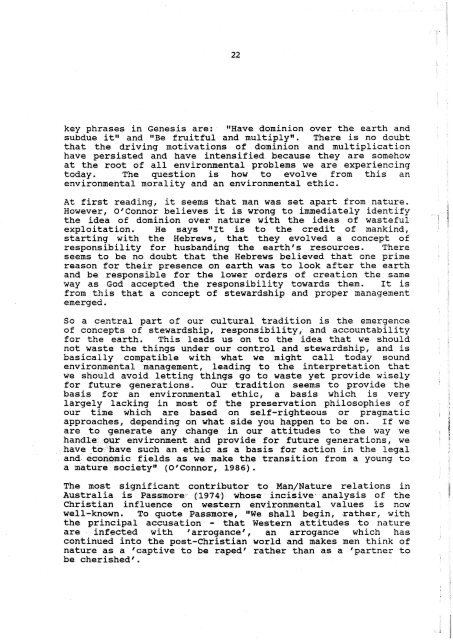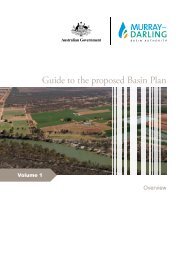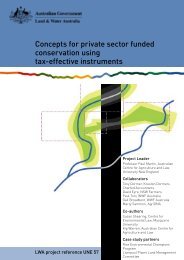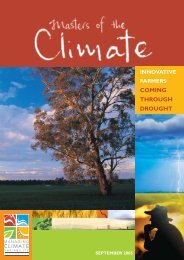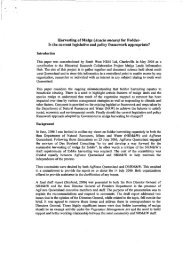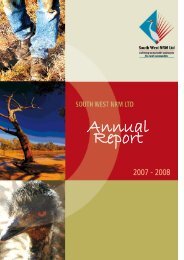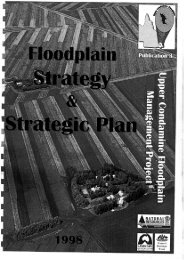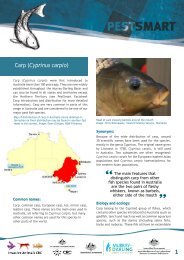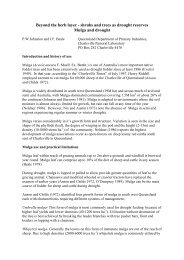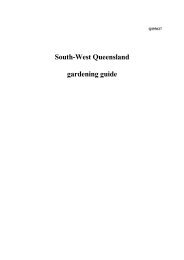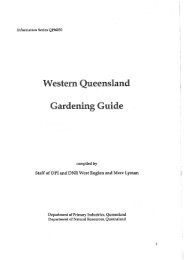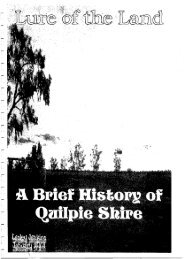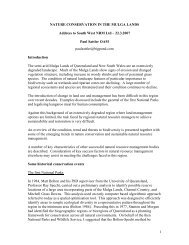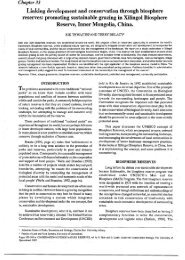soil-conservation-people-religion-and-land.pdf - South West NRM
soil-conservation-people-religion-and-land.pdf - South West NRM
soil-conservation-people-religion-and-land.pdf - South West NRM
You also want an ePaper? Increase the reach of your titles
YUMPU automatically turns print PDFs into web optimized ePapers that Google loves.
key phrases in Genesis are: "Have dominion over the earth <strong>and</strong><br />
subdue it" <strong>and</strong> "Be fruitful <strong>and</strong> multiplyw. There is no doubt<br />
that the driving motivations of dominion <strong>and</strong> multiplication<br />
have persisted <strong>and</strong> have intensified. because they are somehow<br />
at the root of all environmental problems we are experiencing<br />
today. The question is how to evolve from this an<br />
environmental morality <strong>and</strong> an environmental ethic.<br />
At first reading, it seems that man was set apart from nature.<br />
However, OfConnor believes it is wrong to immediately identify<br />
the idea of dominion over nature with the ideas of wasteful<br />
exploitation. He says "It is to the credit of mankind,<br />
starting with the Hebrews, that they evolved a concept of<br />
responsibility for husb<strong>and</strong>ing the earth's resources. There<br />
seems to be no doubt that the Hebrews believed that one prime<br />
reason for their presence on earth was to look after the earth<br />
<strong>and</strong> be responsible for the lower orders of creation the same<br />
way as God accepted the responsibility towards them. It is<br />
from this that a concept of stewardship <strong>and</strong> proper management<br />
emerged.<br />
So a central part of our cultural tradition is the emergence<br />
of concepts of stewardship, responsibility; <strong>and</strong> accountability<br />
for the earth. This leads us on to the idea that we should<br />
not waste the things under our control <strong>and</strong> stewardship, <strong>and</strong> is<br />
basically compatible with what we might call today sound<br />
environmental management, leading to the interpretation that<br />
we should avoid letting things go to waste yet provide wisely<br />
for future generations. Our tradition seems to provide the<br />
basis for an environmental ethic, a basis which is very<br />
largely lacking in most of the preservation philosophies of<br />
our time which are based on self-righteous or pragmatic<br />
approaches, depending on what side you happen to be on. If we<br />
are to generate any change in our attitudes to the way we<br />
h<strong>and</strong>le our environment <strong>and</strong> provide for future generations, we<br />
have to. have such an ethic as a basis for action in the legal<br />
<strong>and</strong> econnmic fields as we make the transition from a young to<br />
a mature society" (08Connor, 1986).<br />
The most significant contributor to Man/Nature relations in<br />
Australia is Passmore (1974) whose incisive- analysis of the<br />
Christian influence on western environmental values is now<br />
well-known. To quote Passmore, "We shall begin, rather, with<br />
the principal accusation - that <strong>West</strong>ern attitudes to nature<br />
are infected with 'arrogance', an arrogance which has<br />
continued into the post-Christian world <strong>and</strong> makes men think of<br />
nature as a 'captive to be raped' rather than as a 'partner to<br />
be cherished'.


